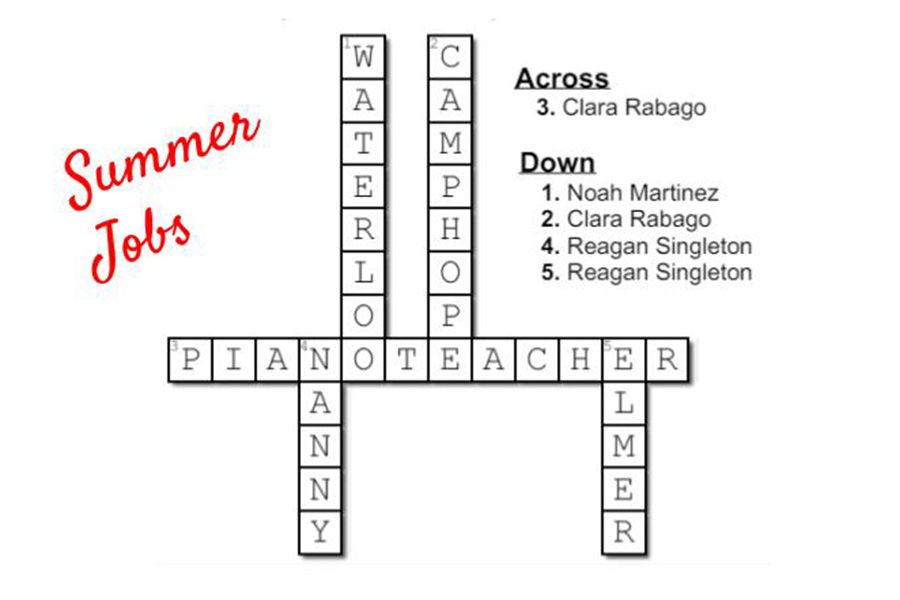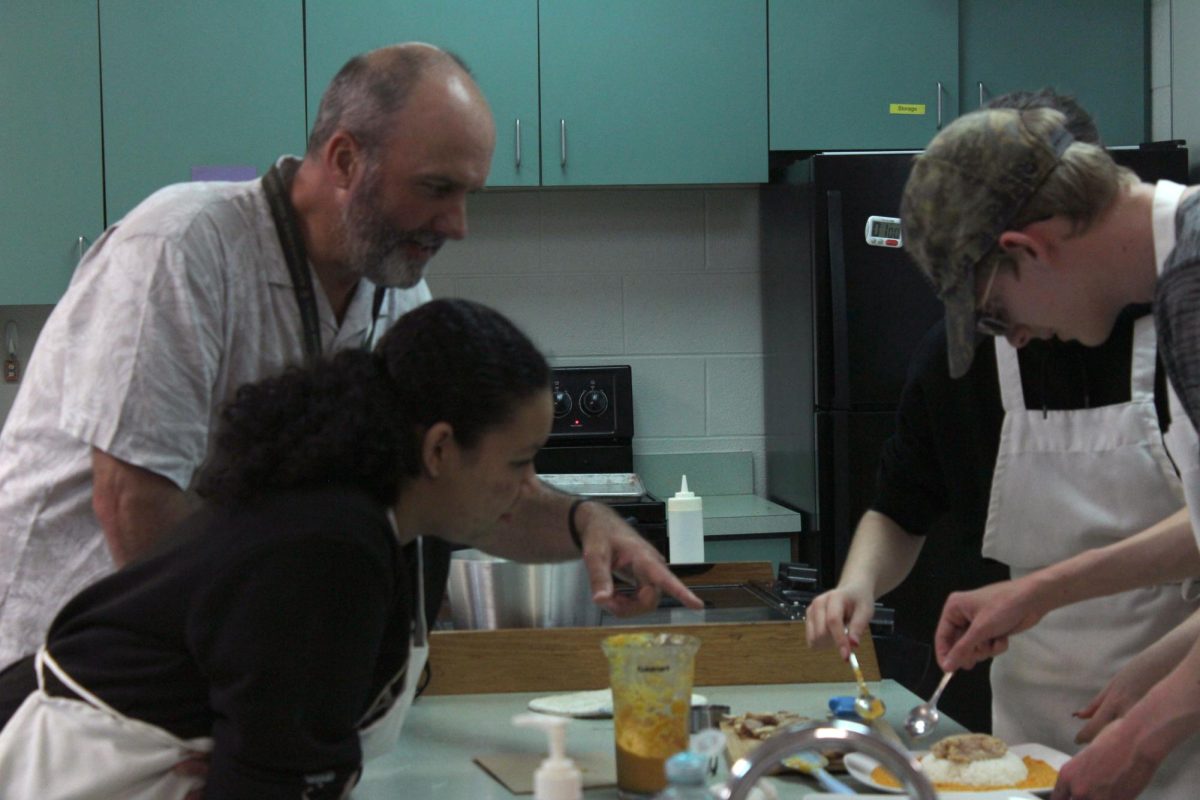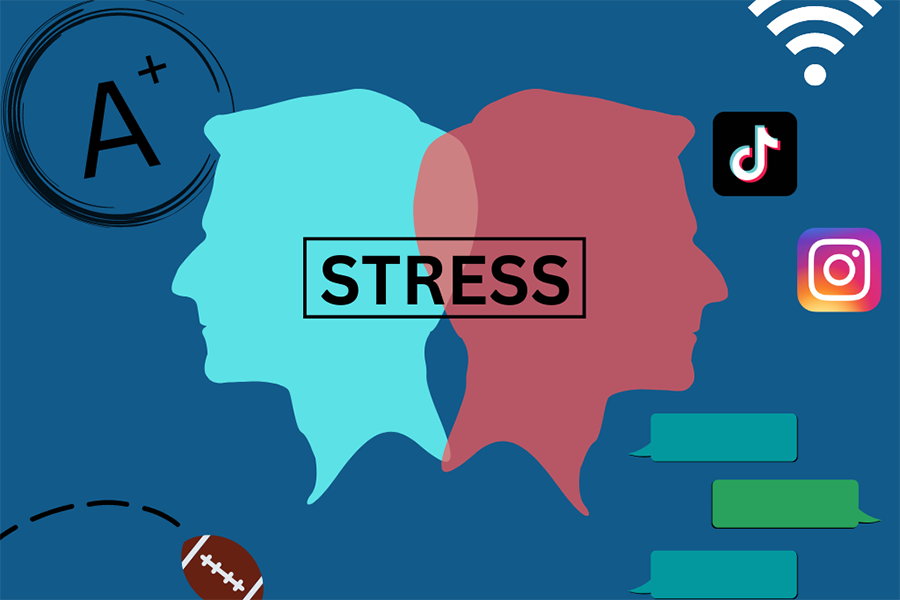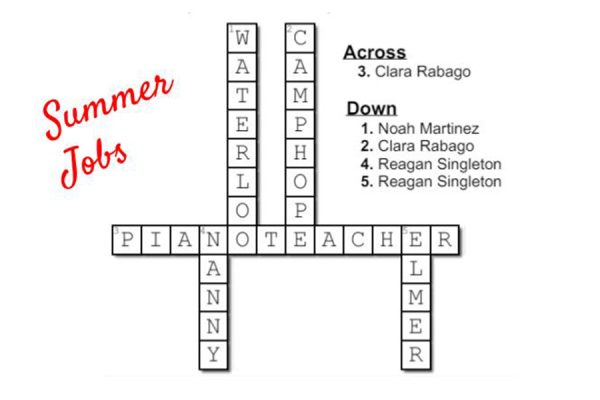Say Yes to the Stress
Student Anxiety Can Cause Success
As students battle deadlines, major assessments and changing trends, anxiety takes control of the brain. Since 1936, when endocrinologist Hans Selye studied an organism’s ability to adapt, the term eustress has been used in psychology to describe “good” stress. “I view stress as both good and bad,” counselor James Sullivan said. “Good stress is often short term that can be used to motivate you, like the stress, or excitement, you feel before playing a sporting game, preparing for a test, or before going on a first date. Bad stress is usually long term and wears you out. Over long times it can lead to anxiety.”
October 19, 2022
As students battle deadlines, major assessments and changing trends, anxiety takes control of the brain. Yet, even during these times, as the pulses quickens and hormones surge, there’s no threat or fear. Instead, stress takes the form of excitement.
The physical, mental or emotional response to a situation or event, stress, is a constant in the lives of many high school students. While some see this as a bad thing, stress can be a beneficial part of a person’s daily routine. According to Stress.org, since 1936, when endocrinologist Hans Selye studied an organism’s ability to adapt, the term eustress has been used in psychology to describe “good” stress.
“I view stress as both good and bad,” high school counselor James Sullivan said. “Good stress is often short term that can be used to motivate you, like the stress, or excitement, you feel before playing a sporting game, preparing for a test or before going on a first date. Bad stress is usually long term and wears you out. Over long times, it can lead to anxiety.”
Stress is more than just the rush of energy or anxiety a person feels before an impactful event. In fact, it can save lives, according to Carrie Curnutt, a licensed specialist in school psychology.
“Stress is also a form of self-preservation,” Curnutt said. “It may keep us safe when presented with ‘risky’ situations such as walking somewhere alone at night, choosing not to get in a car with a friend who has been drinking or locking the doors at your house when you are home alone.”
Not experiencing enough stress results in students who have a lack of motivation, fail to reach desired goals or who do not exercise enough caution. On the other hand, a student under the consistent feelings of apprehension and worry that are not necessarily connected to a specific situation are likely to be experiencing too much stress.
I view stress as both good and bad. Good stress is often short term that can be used to motivate you, like the stress, or excitement, you feel before playing a sporting game, preparing for a test or before going on a first date. Bad stress is usually long term and wears you out. Over long times, it can lead to anxiety.
— James Sullivan, counselor
“Stress is unique to each person; what one student finds stressful another student may not,” Curnutt said. “Students demonstrate the most stress in regard to status or identity roles, extracurricular activities, school performance, social relationships and preparing for post-secondary plans such as college, work or the military. The COVID pandemic was a unique and unprecedented circumstance that appears to have stressed adolescents in a variety of ways that we are continuing to discover.”
Stress can serve as motivation to study for a test, meet goals and help a person reach set deadlines.
“When I’m more stressed, I study more for a test so I don’t do badly on it,” sophomore Roy Ferguson said. “One time, I had this project in quest that I was freaking out over. I was super stressed, so I tried really hard on it and [because I tried hard] I was successful and got a 100.”
As the brain grows with the rest of the human body, stress has an impact, according to Curnutt. Adolescence describes the time of brain maturation and the continued development of neural pathways for brain functioning. As a student learns to cope with stress, they can develop skills that are highly beneficial towards their brain growth but bad stress can do the opposite.
“Appropriately handling stress can lead to the development of neural pathways for a variety of functions, such as good coping skills, problem-solving and resilience,” Curnutt said. “Chronic or ‘toxic’ stress can lead to the overproduction of cortisol in the brain, involved in the flight, fight or freeze response, lending to possible overreacting to situations. Additionally, the brain becomes prone to perceive more situations as stressful.”
Students of all grades should keep track of their stress, and whether it is beneficial or detrimental based on how long it lasts, its cause and what its effect on their daily routine is. Contact James Sullivan at [email protected] or Carrie Curnutt at [email protected] for more information. Students can also reach out to counseling services about managing their stress by using this check in form.


![On March 20, the theatre program performed their UIL One Act play Frankenstein. “I could barely believe what I heard after [it was] announced that we were advancing,” freshman Zack Williams said. “It was crazy. Being one of the only freshmen in the show and also [being] a lead definitely put pressure on my shoulders. I knew that the only thing I could do was my best, but that was until I started to think what if my best was not enough? I was feeling like I could never amount to being what [everyone else] thought I was. Although, after hearing that announcement, I realized that maybe I have something going for me after all.”
Photo courtesy of Cayden Bartolo](https://cphswolfpack.com/wp-content/uploads/2024/04/Capture.png)












![Parking Lot Attendant Alan Gallagher poses next to his sign notifying that students can no longer purchase parking passes. Students without passes will not be able to park in the school parking lot, and if they do, AP’s will be notified. ““[When I catch people skipping] I notify the students AP and from there Im not sure what happens,” Gallagher said. “[I can also stop people for] speeding through the parking lot [since] the speed limit is 10 mph on campus.”](https://cphswolfpack.com/wp-content/uploads/2024/05/Heidi-1-1200x800.jpg)




![Catching a ball, junior Alivia Robinson plays at the Cedar Park vs Glenn game. Having played since she was 5 years old, she is dedicated to softball and has committed to UTPB for softball. “When I got my offer it took me a very long time to decide where,” Robinson said. “Softball has always been my dream for college, and UTPB is my fit. When [I committed] I knew I was going to be loved and supported.”](https://cphswolfpack.com/wp-content/uploads/2024/04/Lilly-Adams-3.13aliviaedit-901.jpg)







































![Smiling for a picture, senior identical twins Ethan and Drew OConnor pose with a statue of a parrot mascot. The twins will both attend the University of Arkansas in the fall and major in business. “I didnt really mind going to different colleges, but we had the same [college] choices,” Ethan said. “We both liked Arkansas, and I dont mind him coming with me. If we cant get [a] rooming situation down, were just going to do a quad together. Which Im kind of down for a quad, because there is more room.” Photo courtesy of Drew O’Connor](https://cphswolfpack.com/wp-content/uploads/2024/05/IMG_7342-488x600.jpg)
![Standing on the drum major’s platform, senior twin sisters Abby and Courtney McDanald pose for a picture. This fall, Abby will attend the University of Texas at Austin to study nursing and Courtney will major in theater education at Stephen F. Austin University. “I was definitely sad about [attending different universities] because weve been so close,” Abby said. “Being that far away from someone for a long time will be hard. We didnt do it on purpose, we just wanted different things in schools. Its definitely sad, but I think itll make seeing her more special.” Photo courtesy of Abby McDanald](https://cphswolfpack.com/wp-content/uploads/2024/05/FullSizeRender-399x600.jpg)

